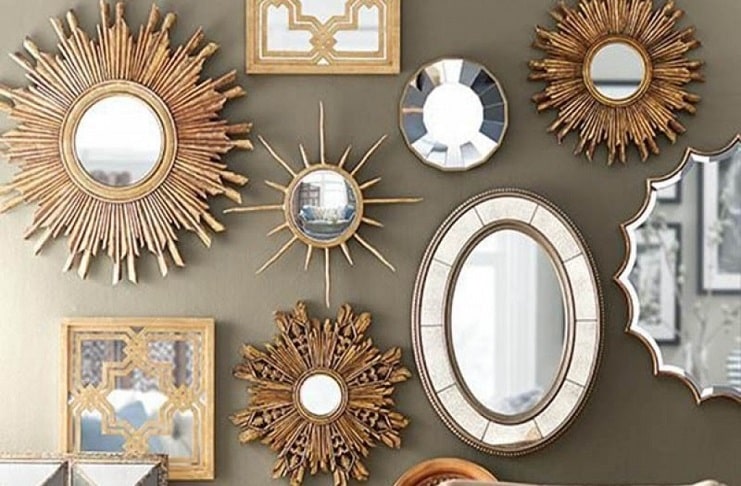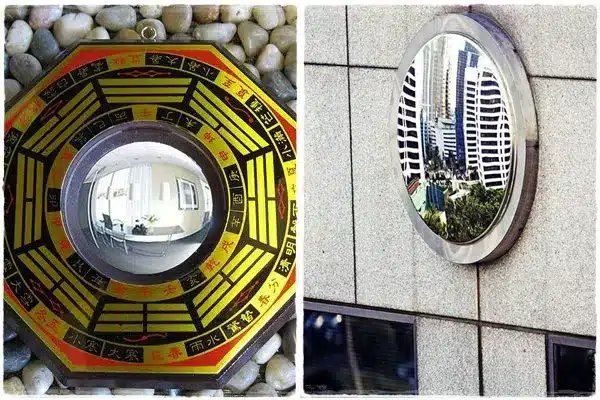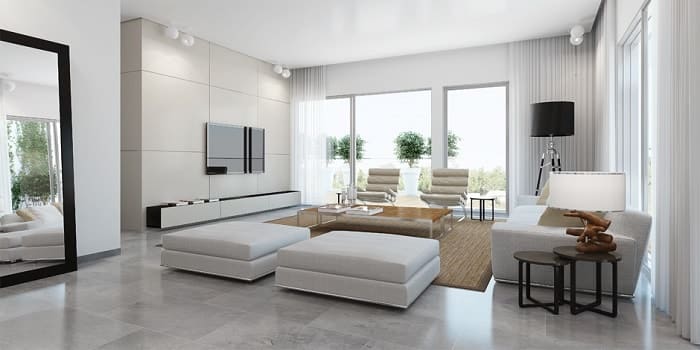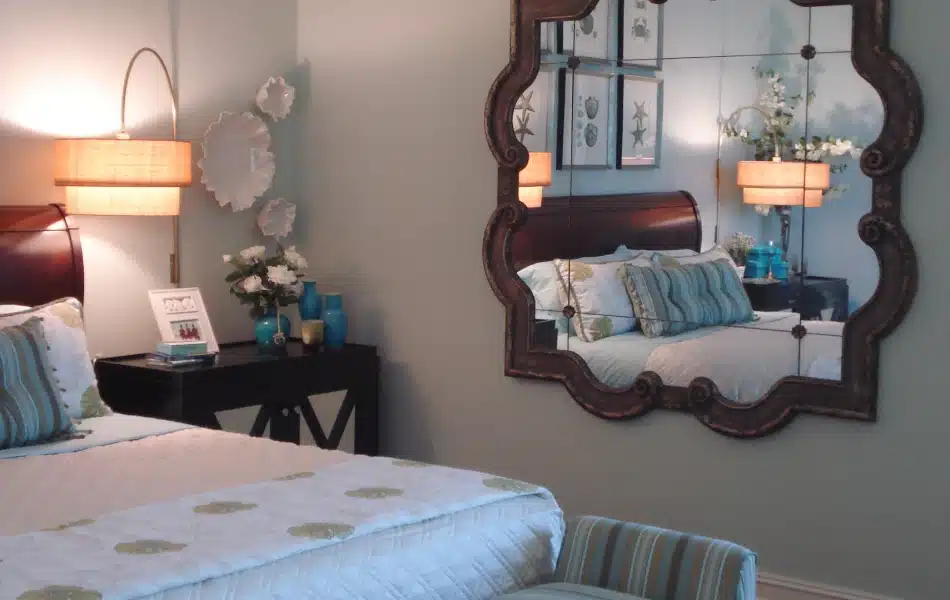Have you ever walked into a room and immediately felt uneasy or uncomfortable, without knowing why? The answer could be in the placement of mirrors. In Feng Shui, mirrors are considered powerful tools that can enhance or disrupt the flow of energy in a space. By strategically placing mirrors in your home, you can improve the overall energy flow, attract good luck, and promote harmony and balance.
In this article, LotusBuddhas will guide you on how to understand the use of mirrors for good feng shui and create a harmonious living space that supports the overall health and happiness of your family.
Uses of mirrors in Feng Shui

In Feng Shui, mirrors are considered powerful tools that can enhance or disrupt the flow of energy in a space. By strategically placing mirrors in your home, you can improve the overall energy flow, attract good luck, and promote harmony and balance.
The use of mirrors in Feng Shui is often associated with the concept of “doubling.” A well-placed mirror can augment the abundance and prosperity in your life, double the joy and happiness, and amplify the positive energy permeating your space. On the other hand, incorrect placement can lead to negative effects, amplifying unwanted elements, reflecting away good luck, or disturbing the harmony of the household.
- Inviting abundance: Place a mirror in your dining room to reflect the dining table. This simple act is believed to double the wealth and prosperity, symbolizing an abundance of food and nourishment.
- Activating the Bagua areas: According to the Feng Shui Bagua, specific areas of your home correspond to different areas of your life. Mirrors can be used to activate these sectors. For instance, you can place a mirror in the wealth area (southeast) to attract more prosperity, or in the relationship area (southwest) to cultivate love and harmony.
- Expanding spaces: Small and cramped spaces have stagnant and limited Qi. Use mirrors to visually expand such spaces, fostering the flow of positive energy and opportunities. Remember, the reflection should depict something that brings joy and positivity.
- Rectifying architectural issues: Mirrors are often used as cures for architectural problems in Feng Shui. For instance, if your home ends in a T-junction, a mirror can be used to deflect the rushing energy away from your home.
- Warding off negative energy: Mirrors, especially bagua mirrors, can be used outside the house to ward off negative energy. However, such use should be approached with caution and ideally under the guidance of a Feng Shui expert.
- Attracting positive energy: A mirror placed facing the front door can reflect positive energy entering the house. Yet, if the mirror directly reflects the door, it could push away all the good Qi flowing in.
Mirrors can become your Feng Shui secret weapon, radiating positivity, inviting wealth, and harmonizing your living space, only if used with the right intent and correct placement. As you incorporate mirrors into your space, be mindful of their effects on the Qi and the balance of Yin and Yang energies in your environment.
Remember, in the philosophy of Feng Shui, every object and placement holds a deeper purpose. With the right understanding and application, mirrors can become a potent tool to transform your space into a sanctuary of balance and prosperity.
Types of mirrors are often used in Feng Shui

There are several types of mirrors that are commonly used in feng shui practice. The meanings and values of each type of mirror in feng shui practice differ based on the specific case and location within the house.. Here are some of the most common ones:
1. Convex mirrors
In feng shui practice, convex mirrors are used to neutralize aggressive positions such as sharp corners of roofs, walls, roads leading directly into the house, electric poles, or large trees blocking the entrance. They are particularly useful for houses located in unfavorable surroundings. When choosing a convex mirror, a spherical mirror with a diameter of at least 20cm is recommended.
Convex mirrors are especially effective in countering negative energy in areas with objects that carry killing intent. If the main door or window is directly hit by such objects, a convex mirror can be hung in front of it to neutralize the negative energy.
Convex mirrors are commonly used outside the house, but if used indoors, care must be taken in choosing the placement and ensuring that the frame is arranged beautifully and nicely.
2. Concave mirrors
In feng shui, concave mirrors have the opposite effect to convex mirrors, as they attract positive energy towards the entrance of the house, bringing luck, positivity, and prosperity to the household. They are often used in areas where energy is stagnant or where there is a lack of positive energy flow.
Concave mirrors are commonly used outside the house to condense energy in areas with good feng shui and to remedy defects such as dark alleys and good energy in distant directions, such as hanging a concave mirror to attract good qi for a house facing a river.
3. Flat mirrors
The flat mirror serves both as a daily use and plays a role in influencing feng shui. When selecting a flat mirror for everyday use in the house, one should choose a mirror with a good plane that does not cause image distortion or blurring.
Square mirrors are preferred as they represent balance and harmony. Round or oval-shaped mirrors can also be chosen to represent completeness. Round mirrors with gold-leafed metal frames are believed to promote the owner’s fortune. One should avoid using prismatic or pointed mirrors like triangles, as they are associated with negative connotations.
According to feng shui standards, flat mirrors used in the house should have a sturdy wooden or metal frame to prevent breakage or accidents that may harm health. Breaking a mirror is considered a feng shui taboo, as it is believed to signify an impending bad omen.
4. Bagua mirrors
These are unique to Feng Shui and are typically used outdoors. The octagonal frame of a Bagua mirror contains the Bagua trigrams, and the mirror itself can be flat, concave, or convex. They are powerful tools for protection and correction of harmful Feng Shui. Depending on the mirror’s curvature, it can absorb (concave) or deflect (convex) negative energy.
5. Full-length mirrors
Full-length mirrors are often used in feng shui to expand a small space or to balance the energy in a room. They can be placed in a variety of locations, including the bedroom, living room or hallway.
6. Infinity mirrors
These mirrors are designed to give an illusion of depth or infinity when light is added. While not traditional in Feng Shui, they can symbolize limitless opportunities and abundance when used appropriately. However, due to their potential to create excessive yang energy, they should be used with caution.
How to Place mirrors in the house for good feng shui
In the sacred practice of Feng Shui, mirrors are not just decorative elements but potent tools for channeling, amplifying, and redirecting the Qi, or energy, that flows within our living spaces. The intelligent positioning of mirrors can result in a harmonious balance of energies and foster positive outcomes in different areas of life. Here are some guidelines for placing mirrors in your house for good Feng Shui:
- Reflecting beauty: Always place mirrors where they can reflect beautiful views, be it an image of nature, a piece of art, or an elegant piece of furniture. By reflecting pleasant scenes, mirrors effectively double the essence of beauty and positivity within your living space.
- Expanding space: In areas of your home that may feel cramped or confined, the strategic placement of a mirror can create the illusion of expanded space, allowing the Qi to flow more freely. A mirror reflecting a window with a beautiful view outside can particularly extend the sense of space.
- Dining area: Place a mirror in the dining area that reflects the dining table. This is believed to attract abundance and prosperity, symbolically doubling the wealth of the household.
- Activating Bagua areas: According to the Bagua, or the Feng Shui energy map, different parts of your home correspond to different life circumstances. Place mirrors to activate these areas. However, avoid placing mirrors in the ‘Challenges and Path in Life’ area (the front and center of the home) as this could lead to confusion and uncertainty.
- Avoiding negative reflections: Mirrors should not reflect any disruptive or disturbing elements, such as clutter, sharp corners of furniture, or another mirror. They should also not reflect the main door, toilets, or the staircase, to avoid flushing away positive energy or creating a sense of instability.
- Bedroom mirrors: Feng Shui suggests caution when placing mirrors in the bedroom. They should not reflect the bed, as this could lead to restlessness and amplify health issues. If you have a mirror in the bedroom, make sure it reflects something pleasant and calming.
- Hallways and corridors: A mirror at the end of a hallway or corridor can slow down the rushing energy, making the space more peaceful and inviting.
- Facing beneficial directions: Mirrors should face the auspicious directions according to the Kua number of the family’s breadwinner, attracting good fortune and well-being.
- Fixing architectural flaws: Feng Shui practitioners often use mirrors to correct architectural flaws. For example, a mirror can be used to deflect the negative energy of a road directly hitting your home, or a sharp corner pointing towards a living area.
LotusBuddhas also note you that, the key to harnessing the power of mirrors in Feng Shui lies in their intentional and mindful placement. With the right understanding and application, the humble mirror can become a powerful ally in your journey towards a harmonious, prosperous and balanced life.
How to place mirrors to attract wealth and good luck

The journey to wealth and good luck is a spiritual quest, and the thoughtful placement of mirrors in the Feng Shui tradition can act as a catalyst, opening up channels of abundance and prosperity. Below are guidelines on how to harness the power of mirrors to attract wealth and good luck:
- Hang a mirror near the front door: Mirrors near the front door can reflect positive energy into your home, inviting wealth and good luck.
- Place a mirror in the dining room: In Feng Shui, the dining room represents wealth and abundance. Hanging a mirror in the dining room can reflect the abundance of food and the people sharing the meal, symbolizing an increase in wealth and prosperity.
- Place a mirror in your workspace: If you work from home or have a home office, placing a mirror on the wall facing your desk can create the illusion of more space and enhance productivity. This can lead to increased income and opportunities.
- Hang a mirror in the living room: In Feng Shui, the living room is the central gathering place in the home, representing wealth, abundance, and good fortune. Hanging a mirror in the living room can create a sense of depth, reflecting the energy and light back into the room and enhancing the positive energy flow.
- Activating the wealth corner: According to the Feng Shui Bagua, the southeast sector of your home or office is the wealth area. Placing a mirror here helps activate and enhance the energy of wealth, attracting prosperity and financial growth.
- Reflecting wealth symbols: If you have symbols of wealth in your home, such as a fish tank or a plant like the Lucky Bamboo or Money Plant, you can place a mirror to reflect these symbols, thereby doubling the wealth energy.
- Correcting architectural flaws: If the architecture of your house is such that it is preventing the accumulation of wealth – for instance, if the back door is directly aligned with the front door causing Qi to flow straight through – you can use a mirror to redirect the energy.
- Avoid hanging mirrors in the bedroom: According to Feng Shui principles, mirrors in the bedroom can create restlessness and disturb the peacefulness of the space. If you must have a mirror in the bedroom, place it where it doesn’t directly face the bed.
Always remember, a clean, well-maintained mirror reflects clearer images and thus, better Qi. Also, always ensure that mirrors reflect positive images or views and avoid reflecting any negative elements.
Incorporate these mirror placement guidelines into your living and workspace, and unlock the flow of wealth and good luck into your life. Mirrors in Feng Shui are not just reflective surfaces; they are potent tools to navigate your life towards a path of abundant prosperity. Enjoy the journey of employing mirrors to transform your life and fortune.
How to place mirrors in specific directions (East, West, South, North)

In the realm of Feng Shui, the positioning of mirrors is a profound and deliberate act, one that considers the balance of the elements, flow of Qi, and the cardinal directions of East, West, North, and South. Each direction has its own unique energetic signature and correlates with various aspects of life.
- East: This is the direction of the rising sun, representing new beginnings and family health. The East resonates with the Wood element. Placing a mirror here helps amplify these energies, nurturing harmony and fresh starts. Ideally, this mirror should reflect greenery or the rising sun to invite healing energy into your home.
- South: The South is the realm of Fame and Reputation in the Feng Shui Bagua, related to the Fire element. To enhance this area, place a mirror that reflects an image of something you wish to be recognized for, like awards or accolades. However, ensure the mirror doesn’t reflect a fireplace or stove, as an excess of Fire element can lead to conflicts.
- West: The West is associated with Creativity and Children, correlating with the Metal element. A mirror in the West can stimulate creativity and foster good luck for children in the house. Make sure this mirror reflects joyous images or symbols of creativity. It’s ideal if this mirror can reflect the setting sun, capturing the essence of Metal.
- North: The North, connected to the Water element, is the domain of Career and Path in Life. To activate this area, place a mirror that reflects the direction of your career growth. This could be your workstation or symbols that represent your career aspirations. If your home has a view of a body of water, placing a mirror to reflect this view can further enhance the Water element, fostering career growth.
When positioning mirrors, remember that their placement should never be random, but carefully chosen to reflect positive images and views. Avoid positioning mirrors where they reflect clutter, sharp edges, or any negative aspects of the home. Finally, the mirrors should always be clean and well maintained, as a dusty or tarnished mirror can dull or distort the Qi.
Things to avoid when hanging mirrors in the house

In the art of Feng Shui, the mirror is more than a reflective surface—it is a portal of energy, capable of attracting positivity or, if improperly used, fostering negativity. Hence, it’s crucial to understand what to avoid when hanging mirrors in your house to maintain the harmonious flow of Qi.
- Reflecting the front door: Avoid placing a mirror directly opposite your front door. In Feng Shui, the front door is significant as it’s where energy enters your home. A mirror placed directly opposite could reflect this energy back out, preventing positive Qi from entering.
- Reflecting clutter: Mirrors amplify what they reflect. Hence, avoid hanging mirrors where they can reflect cluttered areas. This could double the energy of chaos and disorder, leading to increased stress and anxiety.
- Mirrors facing each other: This should be avoided as it creates a disruptive energy vortex, bouncing Qi back and forth and leading to a sense of restlessness and confusion.
- Reflecting sharp edges: Sharp edges or corners create ‘Sha Qi,’ or killing energy. Avoid hanging mirrors where they reflect these sharp corners or edges, as it could intensify this negative energy.
- Reflecting the bed: In the bedroom, it’s crucial to avoid mirrors that reflect the bed. This is believed to invite a third party into the relationship and can also lead to disturbed sleep.
- Cracked or tarnished mirrors: Mirrors that are damaged, cracked, or tarnished can generate distorted and unclear reflections, leading to misdirected, confusing, and potentially harmful energy.
- Reflecting unpleasant views: A mirror should always reflect something beautiful and uplifting. Avoid hanging mirrors that reflect unpleasant views or chaotic areas, as it can double the negative energy.
- Large mirrors in the kitchen: The kitchen is associated with the fire element in Feng Shui, and water (represented by mirrors) extinguishes fire. Hence, large mirrors in the kitchen are not recommended.
The art of Feng Shui is a profound exploration of energy dynamics, and mirrors hold a significant place in this practice. As you step into the realm of Feng Shui with mirrors, it is crucial to remember these points of caution. If you follow the instructions of LotusBuddhas and avoid these common mistakes, you can ensure that the mirrors in your home serve as omens of positivity, prosperity, and peace, reflecting the harmonious essence of a balanced life.





